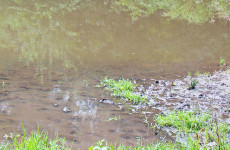Top Stories
Urgent Update: Ireland’s Water Quality Declines Amid Pollution Crisis

UPDATE: Ireland’s water quality is in a state of crisis, with alarming new reports indicating a significant decline since the late 2010s, primarily due to pesticides, drainage, and sewage contamination. The Environmental Protection Agency (EPA) confirms that only 52% of the nation’s surface waters now meet high or good ecological status, a drop from 54% in the previous assessment period of 2016 to 2021.
This urgent update reveals that 48% of Ireland’s surface waters are now classified as moderate, poor, or bad. Despite slight improvements in coastal waters and groundwater, the overall decline poses a severe risk to public health and ecosystems, as stated by Dr. Eimear Cotter, director of the EPA’s Office of Evidence and Assessment. “Our rivers, lakes, and estuaries are the lifeblood of our landscape and support our ecosystems, and our health and wellbeing. But they are struggling,” she highlighted.
The EPA warns that unless immediate action is taken, Ireland is on track to fail to meet both national and EU goals for water quality by 2027. “It’s clear the scale and pace of implementation needs to be increased and sustained,” Dr. Cotter added.
The report indicates that nearly 20% of surface water bodies are heavily polluted with chemicals, including mercury and pesticides. Alarmingly, 44% of river sites report excessive nitrate concentrations, particularly in the east and southeast regions of the country. Fish populations are also suffering, with 142 fish kills recorded between 2019 and 2024, averaging 24 per year.
The EPA attributes the downward trend in water quality to several factors, including agricultural runoff, sediment, and poorly treated sewage discharges from urban wastewater treatment plants. Discharges from domestic systems and stormwater overflows are also contributing to the contamination.
Despite some areas experiencing marginal improvements, these gains are overshadowed by declines elsewhere. The report emphasizes that Ireland’s current trajectory is unsustainable and that significant measures must be taken to combat nutrient loss and pollution across water bodies.
A separate investigation revealed that raw sewage is still being dumped daily into waterways near 15 urban centers, exacerbating the environmental crisis. Additionally, over half of local authorities failed to meet farm inspection targets for slurry management last year.
Immediate action is critical. The EPA urges the government to prioritize targeted measures to address these pressing issues, enhance investment from Uisce Éireann, and improve collaboration among agencies involved in water quality management.
As the situation develops, the public is encouraged to stay informed and advocate for urgent reforms to protect Ireland’s vital water resources. This is a pivotal moment for environmental health in Ireland, and the time for decisive action is NOW.
-

 Top Stories1 month ago
Top Stories1 month agoTributes Surge for 9-Year-Old Leon Briody After Cancer Battle
-

 Entertainment3 months ago
Entertainment3 months agoAimee Osbourne Joins Family for Emotional Tribute to Ozzy
-

 Politics3 months ago
Politics3 months agoDanny Healy-Rae Considers Complaint After Altercation with Garda
-

 Top Stories2 months ago
Top Stories2 months agoIreland Enjoys Summer Heat as Hurricane Erin Approaches Atlantic
-

 World3 months ago
World3 months agoHawaii Commemorates 80 Years Since Hiroshima Bombing with Ceremony
-

 Top Stories3 months ago
Top Stories3 months agoFianna Fáil TDs Urgently Consider Maire Geoghegan-Quinn for Presidency
-

 World3 months ago
World3 months agoGaza Aid Distribution Tragedy: 20 Killed Amid Ongoing Violence
-

 World3 months ago
World3 months agoCouple Convicted of Murdering Two-Year-Old Grandson in Wales
-

 Top Stories1 month ago
Top Stories1 month agoNewcastle West Woman Patricia Foley Found Safe After Urgent Search
-

 Top Stories2 months ago
Top Stories2 months agoClimbing Errigal: A Must-Do Summer Adventure in Donegal
-

 Top Stories2 months ago
Top Stories2 months agoHike Donegal’s Errigal Mountain NOW for Unforgettable Summer Views
-

 World3 months ago
World3 months agoAristocrat Constance Marten and Partner Convicted of Infant Murder









